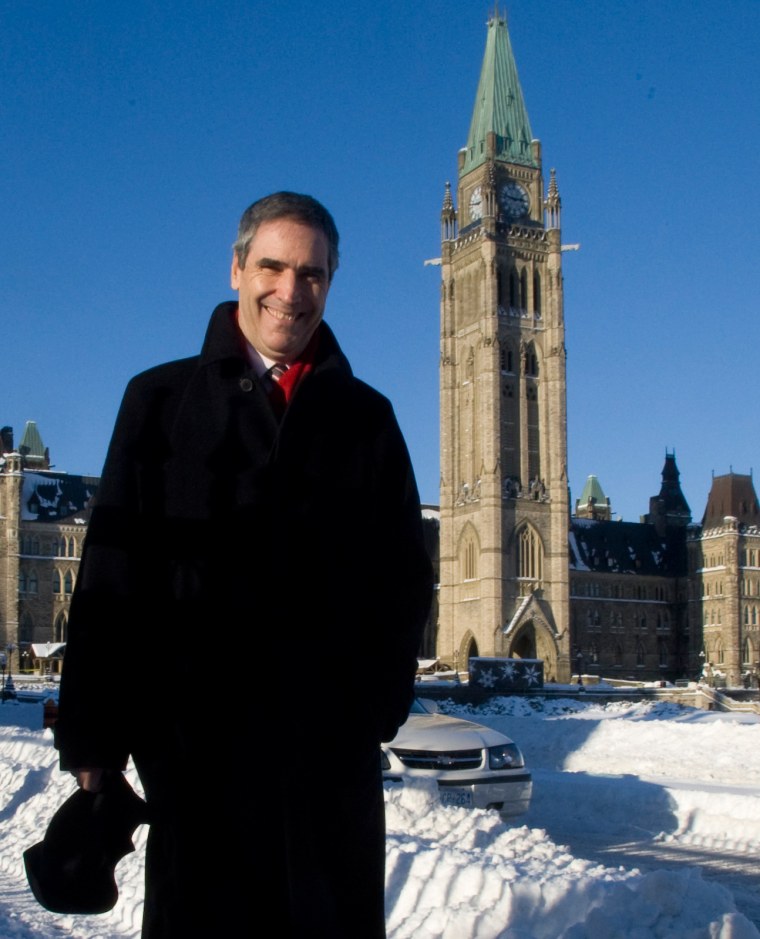The new leader of Canada's once-dominant Liberal Party says he will topple Prime Minister Stephen Harper's Conservative government next month if it does not present a federal budget that addresses the country's economic crisis.
Michael Ignatieff, a former Harvard University professor, made the remark Wednesday shortly after being named interim leader for the main opposition party.
Ignatieff could become Canada's next prime minister if the Liberals and two left-of-center opposition parties stick with a plan to vote out Harper's government and are allowed to form a coalition government in late January. The opposition bloc holds a majority in Parliament.
Ignatieff said it will all depend on what is in next month's federal budget, suggesting the Liberals would be appeased by a significant economic stimulus package.
"I'm prepared to vote no-confidence in this government if the government does not present a budget in the national interest," Ignatieff said. "It's up to Mr. Harper to prepare a budget that will adequately deal with the crisis we're facing."
Harper reached out to Ignatieff on Tuesday in hopes of heading off a renewed ouster effort. He said he hopes the new Liberal leader will meet with him and put forward economic stimulus proposals for the government to consider.
'National interest first'
"It's a little late to reach out, but I'm the kind of leader that wants to put the national interest first," Ignatieff said.
Governor General Michaelle Jean, who is the representative of Britain's Queen Elizabeth II as head of state, holds a mostly ceremonial position but will decide what happens if Harper is ousted. She allowed Harper to suspend Parliament last week in an unprecedented move to avoid a no-confidence vote that had been planned for Monday.
Constitutional experts have speculated that if the opposition does topple Harper, Jean would probably allow the opposition to form a government rather than call new elections since parliamentary elections were just held Oct. 14.
The Liberals, New Democrats and the Bloc Quebecois united against Harper earlier this month after he announced a plan to scrap political subsidies for political parties, something the opposition groups rely on far more than the Conservatives. Although that proposal was withdrawn, the opposition has continued to seek Harper's ouster, saying he has no stimulus plan to protect Canada from the global financial crisis.
Ignatieff said his party will present ideas in the coming weeks that they think will get the economy going again. The credit crisis and a global sell off of commodities have slowed Canada's resource-rich economy, and Canada's central bank has acknowledged the country is in recession.
Charges of inaction
Ignatieff said that while other countries have taken action to deal with the global economic crisis, Harper has shut down Parliament.
"He has lost the confidence of the House of Commons," Ignatieff said. "You cannot run a minority Parliament at a time of national economic crisis with a divisive, spiteful, and unproductive policies that we saw. We just can't do it."
Harper's Conservatives won the Oct. 14 election but they didn't win the majority of Parliament's 308 seats and must rely on the opposition to pass budgets and legislation.
Post likely to become permanent
The Liberal party's national executive official declared Ignatieff leader Wednesday and he is expected to be acclaimed permanent leader at a party convention in May.
Stephane Dion stepped down as Liberal leader earlier than expected after an opposition effort to topple Harper failed last week.
Dion is just the second Liberal leader to fail to become Canada's prime minister. The only other was Edward Blake, who led the party to defeat in 1882 and 1887 elections.
Ignatieff left a prestigious post in 2005 as director of the Carr Center for Human Rights Policy at Harvard to enter Canadian politics. He lost the leadership race the next year to Dion.
When Ignatieff lost Dion in 2006 he was criticized as being out of touch with Canada after spending the better part of 30 years outside the country. His support for the U.S.-led invasion of Iraq also won no friends with Canada's Liberal government, which opposed the war.
Ignatieff, the son of a distinguished diplomat under former Liberal Prime Minister Lester Pearson, has a doctorate in history from Harvard and has lectured at Cambridge, Oxford, the University of California at Berkeley and the London School of Economics.
He also hosted award-winning shows on the BBC, and worked as a journalist in Rwanda and Kosovo. He won a Governor General's Award — a prestigious literary award in Canada — for his nonfiction work about his family history, "The Russian Album."
Ignatieff is the grandson of Count Paul Ignatieff, who was the czar's last minister of education and one of the few to escape execution by the Bolsheviks.
Ignatieff is fluent in Russian, French and English, a must in a country where English and French are the official languages. Dion's struggles to communicate in English became a major issue during the last election campaign.
